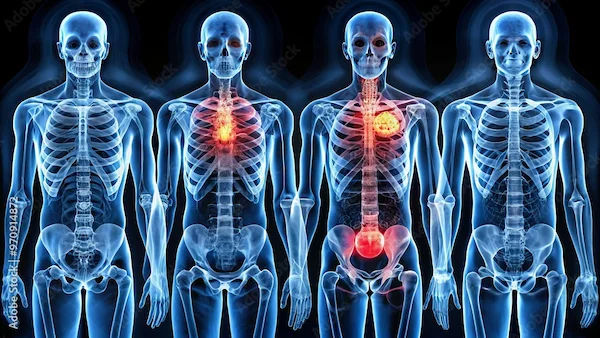Blood Work and Bone Cancer Detection
Learn how blood tests play a supportive role in bone cancer detection, revealing clues about bone activity and overall health. Understand their limitations and why a bone biopsy is essential for a definitive diagnosis.

Written by Dr. Mohammed Kamran
Reviewed by Dr. D Bhanu Prakash MBBS, AFIH, Advanced certificate in critical care medicine, Fellowship in critical care medicine
Last updated on 27th Jul, 2025

Introduction
Cancer is a word that brings fear and uncertainty, but early detection can make a significant difference in treatment and recovery. Bone cancer, though rare, can be serious if not diagnosed early. One of the ways doctors detect bone cancer is through blood work, along with other tests.
In this article, we’ll explain how blood tests help in detecting bone cancer, what symptoms to watch for, and what steps you can take if you suspect something is wrong.
Understanding Bone Cancer
Bone cancer occurs when abnormal cells grow uncontrollably in the bones, forming tumors. There are different types of bone cancer, including:
Osteosarcoma (most common in children and young adults)
Chondrosarcoma (affects cartilage, usually in older adults)
Ewing sarcoma (common in teens and young adults)
Some cancers start in the bones (primary bone cancer), while others spread to the bones from other parts of the body (metastatic bone cancer).
Get Your Symptoms Checked By Top Specialists
Can Blood Tests Detect Bone Cancer?
Blood tests alone cannot confirm bone cancer, but they can provide important clues. Doctors use them alongside imaging tests (like Xrays, MRIs, or CT scans) and biopsies (tissue samples).
Key Blood Tests for Bone Cancer
The blood tests for bone cancer are:
1. Alkaline Phosphatase (ALP) Test
High levels may indicate bone damage or abnormal bone growth.
Often elevated in osteosarcoma or when cancer spreads to bones.
2. Lactate Dehydrogenase (LDH) Test
High LDH levels can suggest rapid cell breakdown, which happens in aggressive cancers.
3. Complete Blood Count (CBC)
Checks for anemia (low red blood cells) or infections, which may occur with cancer.
4. Tumor Markers (in some cases)
Certain proteins (like S100 or NSE) may be elevated in Ewing sarcoma.
While abnormal blood results don’t always mean cancer, they help doctors decide if further tests are needed.
Symptoms That May Indicate Bone Cancer
If you experience any of the following symptoms persistently, consult a doctor:
Bone pain (worsens at night or with activity)
Swelling or a lump near a bone
Unexplained fractures (bones breaking easily)
Fatigue or weight loss without reason
Fever or night sweats (in some cases)
These symptoms can also be caused by other conditions (like arthritis or infections), so proper testing is essential.
How Is Bone Cancer Diagnosed?
If your doctor suspects bone cancer, they may recommend:
1. Imaging Tests
X-rays – Show bone abnormalities.
MRI or CT scans – Provide detailed images of bones and soft tissues.
Bone scan – Detects abnormal bone activity.
2. Biopsy
A small sample of bone tissue is taken and examined under a microscope to confirm cancer.
3. Blood Work (as discussed above)
Managing Bone Cancer: Treatment & Lifestyle Tips
If diagnosed with bone cancer, treatment depends on the type, stage, and overall health. Common treatments include:
Surgery – Removing the tumor (sometimes part of the bone).
Chemotherapy – Drugs to kill cancer cells.
Radiation therapy – High energy beams to destroy cancer cells.
Lifestyle & Dietary Support
While medical treatment is essential, these tips can help improve wellbeing:
Eat a balanced diet – Focus on protein, vitamins (especially D & calcium), and antioxidants.
Stay active (as advised by your doctor) – Gentle exercises can help maintain strength.
Manage pain – Follow prescribed pain relief methods.
Seek emotional support – Counseling or support groups can help cope with stress.
When Should You Get Tested?
If you have persistent bone pain, swelling, or other concerning symptoms, don’t ignore them. Early detection improves treatment success.
You can book a blood test or consult an oncologist through Apollo 24|7 for quick and reliable testing.
Final Thoughts
Bone cancer is rare, but awareness of symptoms and early testing can save lives. Blood work, along with imaging and biopsies, plays a crucial role in diagnosis. If you or a loved one has unexplained bone pain or other warning signs, consult a doctor promptly.
Stay informed, stay proactive, and remember—early action makes a difference!
Call Apollo 24|7 or book an appointment online today.
Consult Top Specialists
Get Your Symptoms Checked By Top Specialists

Dr. Shaik Abdul Kalam
General Practitioner
3 Years • MD (Physician)
Visakhapatnam
Apollo 24|7 Clinic - Andhra Pradesh, Visakhapatnam
(100+ Patients)

Dr. Mohammed Huzef Ul Arifeen
General Practitioner
3 Years • MBBS
Hyderabad
Apollo 24|7 Clinic - Telangana, Hyderabad

Dr. Rohinipriyanka Reddy
General Practitioner
9 Years • MBBS
Hyderabad
Apollo 24|7 Clinic, Hyderabad

Dr. Shesham Srinidhi
General Practitioner
5 Years • MD(physician)
Hyderabad
Apollo 24|7 Clinic, Hyderabad
(100+ Patients)

Dr. Syed Yaseen Ahmed
General Practitioner
7 Years • MBBS
Hyderabad
Apollo 24|7 Clinic, Hyderabad
Consult Top Specialists

Dr. Shaik Abdul Kalam
General Practitioner
3 Years • MD (Physician)
Visakhapatnam
Apollo 24|7 Clinic - Andhra Pradesh, Visakhapatnam
(100+ Patients)

Dr. Mohammed Huzef Ul Arifeen
General Practitioner
3 Years • MBBS
Hyderabad
Apollo 24|7 Clinic - Telangana, Hyderabad

Dr. Rohinipriyanka Reddy
General Practitioner
9 Years • MBBS
Hyderabad
Apollo 24|7 Clinic, Hyderabad

Dr. Shesham Srinidhi
General Practitioner
5 Years • MD(physician)
Hyderabad
Apollo 24|7 Clinic, Hyderabad
(100+ Patients)

Dr. Syed Yaseen Ahmed
General Practitioner
7 Years • MBBS
Hyderabad
Apollo 24|7 Clinic, Hyderabad